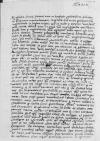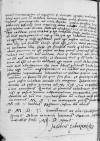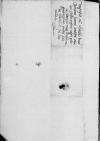Magnifice Domine Orator, scriberem Vestrae Magnificentiae in lingua vulgari, sed, ut credo, quod postquam veni Italy (Italia)⌊ItaliamItaly (Italia)⌋, paene omnia oblitus sum, ut sciat Vestra Magnificentia quisnam sum, credo bene, quod Magnificentia Vestra cognoscit patrem meum. Ego sum filius domini Jan Janowicz Zabrzeziński (†1538), father of Jakub Zabrzeziński; 1503-1516 duke's marshal; 1506 regent of Wołkowysk; 1509 Nowogród voivode; 1510 - castellan and equerry, 1514-1516 starosta of Drohiczyn; 1522-1537 land marshal of Lithuania; 1531 Troki voivode (Urzędnicy 11, p. 251)⌊Ioannis ZabrezenskyJan Janowicz Zabrzeziński (†1538), father of Jakub Zabrzeziński; 1503-1516 duke's marshal; 1506 regent of Wołkowysk; 1509 Nowogród voivode; 1510 - castellan and equerry, 1514-1516 starosta of Drohiczyn; 1522-1537 land marshal of Lithuania; 1531 Troki voivode (Urzędnicy 11, p. 251)⌋, marchionis Lithuania⌊LituaniaeLithuania⌋, qui fueram in studio in Italy (Italia)⌊ItaliaItaly (Italia)⌋. Nunc, ut sciat Vestra Magnificentia casum, qui mihi intervenit: quando fui Padova (Patavium, Padua), city in northern Italy, Veneto, on the Bacchiglione river, 40 km N of Venice⌊PadvaePadova (Patavium, Padua), city in northern Italy, Veneto, on the Bacchiglione river, 40 km N of Venice⌋ et postea fui Bologna (Bononia), city in Italy at the southern end of the plain of the Po valley, between 1506 and 1860 it belonged to the Papal State⌊BononiaeBologna (Bononia), city in Italy at the southern end of the plain of the Po valley, between 1506 and 1860 it belonged to the Papal State⌋, Jan Janowicz Zabrzeziński (†1538), father of Jakub Zabrzeziński; 1503-1516 duke's marshal; 1506 regent of Wołkowysk; 1509 Nowogród voivode; 1510 - castellan and equerry, 1514-1516 starosta of Drohiczyn; 1522-1537 land marshal of Lithuania; 1531 Troki voivode (Urzędnicy 11, p. 251)⌊paterJan Janowicz Zabrzeziński (†1538), father of Jakub Zabrzeziński; 1503-1516 duke's marshal; 1506 regent of Wołkowysk; 1509 Nowogród voivode; 1510 - castellan and equerry, 1514-1516 starosta of Drohiczyn; 1522-1537 land marshal of Lithuania; 1531 Troki voivode (Urzędnicy 11, p. 251)⌋ misit pro me, ut reverterer in patriam infra tres menses, et quot irem per Cologne (Köln, Colonia, Colonia Agrippina), city in western Germany, on the Rhine river⌊ColoniamCologne (Köln, Colonia, Colonia Agrippina), city in western Germany, on the Rhine river⌋, ut perficerem aliquot votum. Bene veni Paris (Lutetia Parisiorum, Parisii), city in central France, on the Seine river, capital of France⌊ParisiisParis (Lutetia Parisiorum, Parisii), city in central France, on the Seine river, capital of France⌋. Quando fui Paris (Lutetia Parisiorum, Parisii), city in central France, on the Seine river, capital of France⌊ParisiisParis (Lutetia Parisiorum, Parisii), city in central France, on the Seine river, capital of France⌋, inveni quendam iuvenem Polonum, quem ego noscebam prius in patria, et ipse manebat cum uno, qui vocatur Antonius Rincon (†1541), Spanish diplomat in the service of the King of France; 1522-1525 envoy of King Francis I of Valois to Poland and Hungary; 1530-1541 - to Suleiman I; 1538-1541 official French ambassador to the Ottoman court (POCIECHA 2, p. 176-181, 342-351, 359-361, 368-370, 443-446, 583-585; SETTON 1984, p. 216-217, 312-319, 321, 325, 334, 360-363, 450, 456-459)⌊Antonius RinconAntonius Rincon (†1541), Spanish diplomat in the service of the King of France; 1522-1525 envoy of King Francis I of Valois to Poland and Hungary; 1530-1541 - to Suleiman I; 1538-1541 official French ambassador to the Ottoman court (POCIECHA 2, p. 176-181, 342-351, 359-361, 368-370, 443-446, 583-585; SETTON 1984, p. 216-217, 312-319, 321, 325, 334, 360-363, 450, 456-459)⌋. Et dixi sibi: si vellet mecum venire ad patriam. Dixit, quod sic bene. Quando fuimus extra totam France (Gallia, Francia), the kingdom⌊patriam GallorumFrance (Gallia, Francia), the kingdom⌋, tunc ipse narravit mihi, quomodo accepit domino suo in the other hand, written over a⌈aoo in the other hand, written over a⌉ multos lapides pretiosos. Ego dixi: quomodo hoc est possibile. Ipse dixit, quod sic, et ego fui maxime turbatus et cogitavi inter me velle ab ipso discedere. Postea dixi intra me: si ego discedam ab ipso, si ibunt post me et invenient me absque ipso, dicent, quod ego scivi de omnibus rebus, quas ipse acceperat. Et dixi ei: vide, si venient post nos, ne ego sim in culpa. Ipse mihi respondit, quod non timerem, quod si a casu venirent post nos, quod ipse defert istas res Ferdinand I of Habsburg (*1503 – †1564), from 1521 Archduke of Austria, from 1526 King of Bohemia and Hungary, Croatia and Slavonia as Ferdinand I, 1531-1558 King of the Romans, 1558-1564 Holy Roman Emperor; son of Philip I the Handsome and Joanna the Mad of Castile, a younger brother of Charles V of Habsburg⌊fratri Charles V of Habsburg (*1500 – †1558), ruler of the Burgundian territories (1506-1555), King of Spain as Charles I (1516-1556), King of Naples and Sicily, King of the Romans (1519-1530), Holy Roman Emperor of the German Nation (elected 1519, crowned 1530, abdicated 1556); son of Philip I the Handsome and Joanna the Mad of Castile⌊imperatorisCharles V of Habsburg (*1500 – †1558), ruler of the Burgundian territories (1506-1555), King of Spain as Charles I (1516-1556), King of Naples and Sicily, King of the Romans (1519-1530), Holy Roman Emperor of the German Nation (elected 1519, crowned 1530, abdicated 1556); son of Philip I the Handsome and Joanna the Mad of Castile⌋ FerdinandoFerdinand I of Habsburg (*1503 – †1564), from 1521 Archduke of Austria, from 1526 King of Bohemia and Hungary, Croatia and Slavonia as Ferdinand I, 1531-1558 King of the Romans, 1558-1564 Holy Roman Emperor; son of Philip I the Handsome and Joanna the Mad of Castile, a younger brother of Charles V of Habsburg⌋, quia accepi ipsas a suo inimico et suo traditore, qui duxit The Ottoman Turks (Turcae) ⌊TurkasThe Ottoman Turks (Turcae) ⌋ turcha ad Vienna (Wien, Vienna), city in eastern Austria, on the Danube river⌊VigennamVienna (Wien, Vienna), city in eastern Austria, on the Danube river⌋. Bene post quam venimus ad istam civitatem, quae vocatur Mons (Mons Henaus), city in the Low Countries, Hainaut, 70 km SW of Brussels, today in Belgium⌊Mons HenausMons (Mons Henaus), city in the Low Countries, Hainaut, 70 km SW of Brussels, today in Belgium⌋, et dormivimus per unam noctem in crastinum, quod hodie sunt quindecim dies, venerunt ibi ad cameram et ego eram aduc in lecto et statim acceperunt meum ensem et voluerunt meo servitori accipere similiter, sed ipse expulsit omnes de camera et proiectis omnibus illis rebus proiecit se, salva reverentia Maiestatis Vestrae, in cloakam. Et ego vidi, quod ms. quot(!)
⌈quodquod ms. quot(!)
⌉ ipse fugiebat, cogitavi intra me: quod ms. quot(!)
⌈quodquod ms. quot(!)
⌉ si me invenient cum istis rebus, facient de me tamquam de latrone. Nesciebam, quid debebam facere. Proiectis omnibus rebus meis saltavi per unam fenestram et veni ad unam ecclesiam, quae vocatur Sancti Nicolai et credebam <h>abere meas peccunias mecum, et ego omnes
 UUB, H. 154, f. 63v
dimisi. Innumero centum et sexaginta 4 ducatos exceptis duobus frustris auri, quos non credebam mecum habere, qualia frustra sunt valoris quadraginta vel circa ducatos, qualia frustra unus plebanus, pessimus homo, maximus latro, accepit mihi dicendo, quod ms. quot(!)
⌈quodquod ms. quot(!)
⌉ volebat mihi servare. Certe ipse usurpavit eas et non vult mihi ipsas reddere. Prius dicebat, quod ego acceperam furto, postea scivit ab illis persequentibus nos, quod illa, quae ego habebam, erant mea. Et ego dixi, quod mihi redderet, quod ms. quot(!)
⌈quodquod ms. quot(!)
⌉ ego possem mittere in carcerem illos, qui fuerunt causa, quod ms. quot(!)
⌈quodquod ms. quot(!)
⌉ ego perdidi meas pecunias et re<h>aberem illas. Certe iste curatus, credo, quod ab meis inimicis hidden by binding⌈[is]is hidden by binding⌉ <h>abuit praemium, ut ipsi possent re<h>abere prius suas res. Ipse numquam voluit nec vult eas reddere, dicit, quod decanus sibi commisit, ut non eas redderet mihi. Et decanus dicit, quod non habet licentiam ab episcopo, ut mihi redderet. Ego nescio, quid debeo facere, nisi erit adiutorium Dei, sum totus perditus. Unde humiliter rogo Vestram Magnificentiam, ut vellet ad sacram mai ms. g(!)
⌈ii ms. g(!)
⌉estatem imperatorem intercedere, ut saltem possim exire ecclesiam, ut fama non sit, quod ms. quot(!)
⌈quodquod ms. quot(!)
⌉ sim fur, et praecipue, quod ms. quot(!)
⌈quodquod ms. quot(!)
⌉ possim rehabere a curato ms. Acurato(!)
⌈a curatoa curato ms. Acurato(!)
⌉ isto, maximo latrine, meas pecunias et possim pervenire ad Magnificam Dominationem Vestram. Cui in posterum cum omnibus servitiis et placitis retribuam non aliud, nisi quod possim venire ad faciendam ms. adfaciendam(!)
⌈ad faciendamad faciendam ms. adfaciendam(!)
⌉ reverentiam, sicut domino ac patri me<o> gratiosissimo non aliud ms. aliut(!)
⌈aliudaliud ms. aliut(!)
⌉ nisi quot in manus Magnificae Dominationis Vestrae me recommendo, postquam fuero apud Magnificam Dominationem Vestram melius, referam casum, non aliud eiusdem Magnificae Dominationis Vestrae humillimus ac oboedientissimus servus.
UUB, H. 154, f. 63v
dimisi. Innumero centum et sexaginta 4 ducatos exceptis duobus frustris auri, quos non credebam mecum habere, qualia frustra sunt valoris quadraginta vel circa ducatos, qualia frustra unus plebanus, pessimus homo, maximus latro, accepit mihi dicendo, quod ms. quot(!)
⌈quodquod ms. quot(!)
⌉ volebat mihi servare. Certe ipse usurpavit eas et non vult mihi ipsas reddere. Prius dicebat, quod ego acceperam furto, postea scivit ab illis persequentibus nos, quod illa, quae ego habebam, erant mea. Et ego dixi, quod mihi redderet, quod ms. quot(!)
⌈quodquod ms. quot(!)
⌉ ego possem mittere in carcerem illos, qui fuerunt causa, quod ms. quot(!)
⌈quodquod ms. quot(!)
⌉ ego perdidi meas pecunias et re<h>aberem illas. Certe iste curatus, credo, quod ab meis inimicis hidden by binding⌈[is]is hidden by binding⌉ <h>abuit praemium, ut ipsi possent re<h>abere prius suas res. Ipse numquam voluit nec vult eas reddere, dicit, quod decanus sibi commisit, ut non eas redderet mihi. Et decanus dicit, quod non habet licentiam ab episcopo, ut mihi redderet. Ego nescio, quid debeo facere, nisi erit adiutorium Dei, sum totus perditus. Unde humiliter rogo Vestram Magnificentiam, ut vellet ad sacram mai ms. g(!)
⌈ii ms. g(!)
⌉estatem imperatorem intercedere, ut saltem possim exire ecclesiam, ut fama non sit, quod ms. quot(!)
⌈quodquod ms. quot(!)
⌉ sim fur, et praecipue, quod ms. quot(!)
⌈quodquod ms. quot(!)
⌉ possim rehabere a curato ms. Acurato(!)
⌈a curatoa curato ms. Acurato(!)
⌉ isto, maximo latrine, meas pecunias et possim pervenire ad Magnificam Dominationem Vestram. Cui in posterum cum omnibus servitiis et placitis retribuam non aliud, nisi quod possim venire ad faciendam ms. adfaciendam(!)
⌈ad faciendamad faciendam ms. adfaciendam(!)
⌉ reverentiam, sicut domino ac patri me<o> gratiosissimo non aliud ms. aliut(!)
⌈aliudaliud ms. aliut(!)
⌉ nisi quot in manus Magnificae Dominationis Vestrae me recommendo, postquam fuero apud Magnificam Dominationem Vestram melius, referam casum, non aliud eiusdem Magnificae Dominationis Vestrae humillimus ac oboedientissimus servus.
 UUB, H. 154, f. 63v
dimisi. Innumero centum et sexaginta 4 ducatos exceptis duobus frustris auri, quos non credebam mecum habere, qualia frustra sunt valoris quadraginta vel circa ducatos, qualia frustra unus plebanus, pessimus homo, maximus latro, accepit mihi dicendo, quod ms. quot(!)
⌈quodquod ms. quot(!)
⌉ volebat mihi servare. Certe ipse usurpavit eas et non vult mihi ipsas reddere. Prius dicebat, quod ego acceperam furto, postea scivit ab illis persequentibus nos, quod illa, quae ego habebam, erant mea. Et ego dixi, quod mihi redderet, quod ms. quot(!)
⌈quodquod ms. quot(!)
⌉ ego possem mittere in carcerem illos, qui fuerunt causa, quod ms. quot(!)
⌈quodquod ms. quot(!)
⌉ ego perdidi meas pecunias et re<h>aberem illas. Certe iste curatus, credo, quod ab meis inimicis hidden by binding⌈[is]is hidden by binding⌉ <h>abuit praemium, ut ipsi possent re<h>abere prius suas res. Ipse numquam voluit nec vult eas reddere, dicit, quod decanus sibi commisit, ut non eas redderet mihi. Et decanus dicit, quod non habet licentiam ab episcopo, ut mihi redderet. Ego nescio, quid debeo facere, nisi erit adiutorium Dei, sum totus perditus. Unde humiliter rogo Vestram Magnificentiam, ut vellet ad sacram mai ms. g(!)
⌈ii ms. g(!)
⌉estatem imperatorem intercedere, ut saltem possim exire ecclesiam, ut fama non sit, quod ms. quot(!)
⌈quodquod ms. quot(!)
⌉ sim fur, et praecipue, quod ms. quot(!)
⌈quodquod ms. quot(!)
⌉ possim rehabere a curato ms. Acurato(!)
⌈a curatoa curato ms. Acurato(!)
⌉ isto, maximo latrine, meas pecunias et possim pervenire ad Magnificam Dominationem Vestram. Cui in posterum cum omnibus servitiis et placitis retribuam non aliud, nisi quod possim venire ad faciendam ms. adfaciendam(!)
⌈ad faciendamad faciendam ms. adfaciendam(!)
⌉ reverentiam, sicut domino ac patri me<o> gratiosissimo non aliud ms. aliut(!)
⌈aliudaliud ms. aliut(!)
⌉ nisi quot in manus Magnificae Dominationis Vestrae me recommendo, postquam fuero apud Magnificam Dominationem Vestram melius, referam casum, non aliud eiusdem Magnificae Dominationis Vestrae humillimus ac oboedientissimus servus.
UUB, H. 154, f. 63v
dimisi. Innumero centum et sexaginta 4 ducatos exceptis duobus frustris auri, quos non credebam mecum habere, qualia frustra sunt valoris quadraginta vel circa ducatos, qualia frustra unus plebanus, pessimus homo, maximus latro, accepit mihi dicendo, quod ms. quot(!)
⌈quodquod ms. quot(!)
⌉ volebat mihi servare. Certe ipse usurpavit eas et non vult mihi ipsas reddere. Prius dicebat, quod ego acceperam furto, postea scivit ab illis persequentibus nos, quod illa, quae ego habebam, erant mea. Et ego dixi, quod mihi redderet, quod ms. quot(!)
⌈quodquod ms. quot(!)
⌉ ego possem mittere in carcerem illos, qui fuerunt causa, quod ms. quot(!)
⌈quodquod ms. quot(!)
⌉ ego perdidi meas pecunias et re<h>aberem illas. Certe iste curatus, credo, quod ab meis inimicis hidden by binding⌈[is]is hidden by binding⌉ <h>abuit praemium, ut ipsi possent re<h>abere prius suas res. Ipse numquam voluit nec vult eas reddere, dicit, quod decanus sibi commisit, ut non eas redderet mihi. Et decanus dicit, quod non habet licentiam ab episcopo, ut mihi redderet. Ego nescio, quid debeo facere, nisi erit adiutorium Dei, sum totus perditus. Unde humiliter rogo Vestram Magnificentiam, ut vellet ad sacram mai ms. g(!)
⌈ii ms. g(!)
⌉estatem imperatorem intercedere, ut saltem possim exire ecclesiam, ut fama non sit, quod ms. quot(!)
⌈quodquod ms. quot(!)
⌉ sim fur, et praecipue, quod ms. quot(!)
⌈quodquod ms. quot(!)
⌉ possim rehabere a curato ms. Acurato(!)
⌈a curatoa curato ms. Acurato(!)
⌉ isto, maximo latrine, meas pecunias et possim pervenire ad Magnificam Dominationem Vestram. Cui in posterum cum omnibus servitiis et placitis retribuam non aliud, nisi quod possim venire ad faciendam ms. adfaciendam(!)
⌈ad faciendamad faciendam ms. adfaciendam(!)
⌉ reverentiam, sicut domino ac patri me<o> gratiosissimo non aliud ms. aliut(!)
⌈aliudaliud ms. aliut(!)
⌉ nisi quot in manus Magnificae Dominationis Vestrae me recommendo, postquam fuero apud Magnificam Dominationem Vestram melius, referam casum, non aliud eiusdem Magnificae Dominationis Vestrae humillimus ac oboedientissimus servus.


